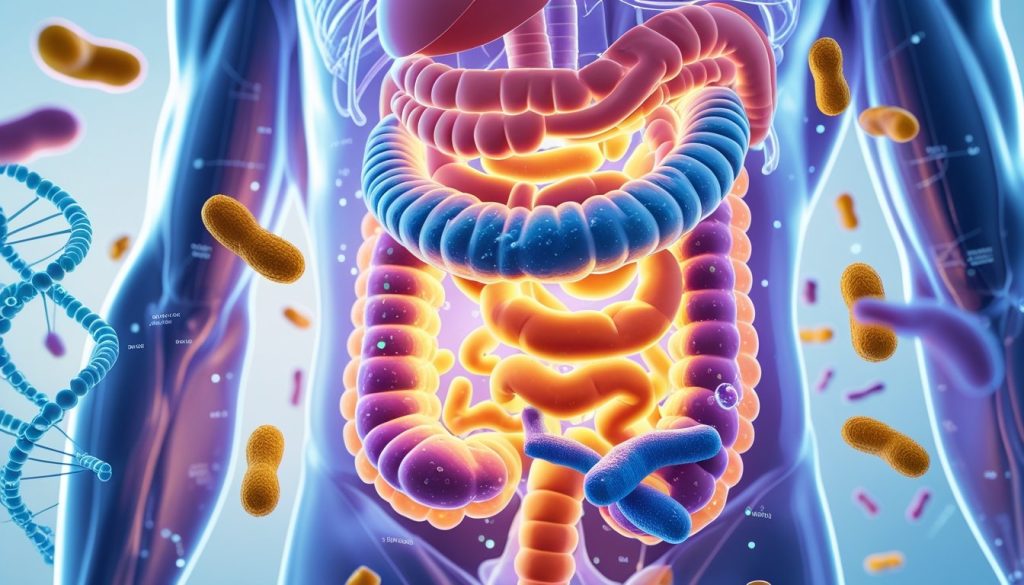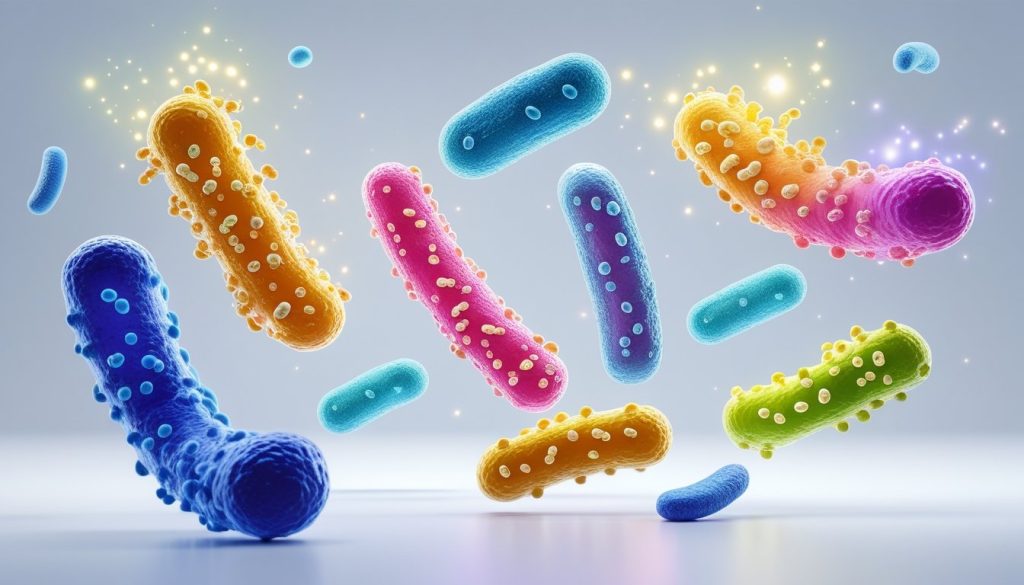Probiotics Power: The human digestive system houses trillions of microorganisms that play crucial roles in maintaining optimal health, with probiotics emerging as powerful allies in transforming digestive function. These beneficial bacteria, often referred to as “friendly” or “good” bacteria, function through sophisticated mechanisms to restore balance, enhance nutrient absorption, and support overall gut health.
Understanding Probiotic Mechanisms and Digestive Transformation
Probiotics exert their transformative effects through multiple pathways that directly impact digestive health. These beneficial microorganisms work by inhibiting the growth of pathogenic bacteria in the gastrointestinal tract, fostering colonization resistance, improving intestinal transit, and producing antimicrobial substances that help normalize disrupted microbiota1. The production of bioactive metabolites, particularly short-chain fatty acids, and the reduction of luminal pH in the colon represent fundamental mechanisms through which probiotics enhance digestive function12.

The restoration of gut balance represents one of the most significant ways probiotics transform digestion. When individuals consume antibiotics, experience stress, or maintain diets high in processed foods, the delicate balance of gut bacteria becomes disrupted2. Probiotics help replenish beneficial bacteria, effectively combating the negative effects of harmful microbes and restoring the natural equilibrium essential for optimal digestive function.
The Seven Transformative Probiotic Strains
Lactobacillus acidophilus NCFM®
Lactobacillus acidophilus NCFM® stands as the most extensively studied probiotic strain worldwide, with over 60 clinical studies demonstrating its remarkable health benefits3. This strain exhibits exceptional capacity to adhere to various intestinal cells, demonstrates tolerance to bile, and shows resistance to acid – essential attributes for effective probiotic function4. Laboratory research has revealed that certain strains of Lactobacillus acidophilus can decrease cholesterol levels by over 50%, highlighting their potential significance in enhancing cardiovascular wellness4.
The digestive benefits of Lactobacillus acidophilus extend beyond cholesterol management. This strain has demonstrated efficacy in preventing gastrointestinal illnesses among adults and mitigating symptoms associated with common respiratory infections in children4. Its ability to enhance nutrient absorption, particularly lactose digestion, makes it invaluable for individuals with lactose intolerance25.
Lactobacillus rhamnosus
Lactobacillus rhamnosus has developed distinctive adaptations enabling survival in both acidic and basic environments present throughout the human digestive system4. The strain's capacity to attach and colonize intestinal walls enables it to provide extended benefits, making it a cornerstone ingredient in many digestive supplements67.
This versatile strain demonstrates particular effectiveness in treating irritable bowel syndrome (IBS), with clinical studies showing significant improvements in symptoms including bloating, gas, and abdominal discomfort4. Additionally, Lactobacillus rhamnosus supports immune system function and has shown beneficial effects in managing eczema and allergies4.
Lactobacillus casei
Lactobacillus casei represents another well-researched strain commonly found in effective probiotic formulations67. This strain contributes to improved gut flora balance and demonstrates particular effectiveness in reducing gastrointestinal troubles including both diarrhea and constipation8. Its inclusion in multi-strain formulations enhances the overall therapeutic potential of probiotic supplements.
Bifidobacterium lactis Bi-07
Bifidobacterium lactis Bi-07 has been extensively studied for its beneficial effects on digestive health and immune function3. This strain enhances the body's natural defense mechanisms, improves regularity of bowel movements, and supports overall gut health3. Its presence in probiotic supplements ensures a broad spectrum of health benefits, particularly in maintaining digestive regularity.
Lactobacillus paracasei LPC-37
Lactobacillus paracasei LPC-37 represents a well-researched strain known for its ability to support immune health while maintaining healthy gut bacteria balance3. Clinical studies have highlighted its role in reducing the duration and severity of respiratory infections while simultaneously improving overall gut health3. This dual-action benefit makes it particularly valuable for individuals seeking comprehensive digestive and immune support.

Bifidobacterium longum
Bifidobacterium longum plays a crucial role in maintaining digestive health through its ability to ferment dietary fibers and produce beneficial short-chain fatty acids67. These metabolites nourish the cells of the gut lining and enhance nutrient absorption, contributing to improved overall digestive function2. The strain's presence in multi-strain formulations adds significant value to probiotic supplements.
Streptococcus thermophilus
Streptococcus thermophilus completes the seven-strain profile with its unique ability to enhance lactose digestion and support overall gut health67. This strain works synergistically with other probiotics to create a comprehensive approach to digestive wellness, particularly benefiting individuals with dairy sensitivities.
Enhancing Digestive Function Through Multiple Pathways
Nutrient Absorption Enhancement
Probiotics play a significant role in enhancing the digestion and absorption of various nutrients. For lactose digestion, certain probiotic strains help break down lactose, making dairy products more accessible for individuals with lactose intolerance25. The fermentation of dietary fibers by probiotics produces short-chain fatty acids that nourish gut lining cells and enhance overall nutrient absorption2.
Vitamin and Metabolite Production
Probiotic strains contribute to the production of essential compounds including B vitamins and vitamin K, supplementing nutritional intake2. The production of short-chain fatty acids through fiber fermentation provides additional benefits including reduced inflammation and improved gut barrier function2.

Digestive Issue Resolution
The seven transformative probiotic strains demonstrate remarkable effectiveness in addressing various digestive concerns. For diarrhea management, probiotics help restore gut flora after antibiotic use or viral infections, reducing both duration and severity28. Constipation relief occurs through increased gut transit time and normalized bowel movements2. IBS symptom management includes significant reductions in bloating, gas, and abdominal pain24.
Clinical Evidence and Research Support
Research demonstrates that probiotic supplementation with specific strains can reduce the risk of antibiotic-associated diarrhea by 51%1. Studies investigating multi-strain formulations show enhanced benefits compared to single-strain supplements, supporting the use of comprehensive seven-strain formulations9.
The effectiveness of probiotic strains depends on strain-specific mechanisms, emphasizing the importance of selecting supplements containing well-researched, clinically-validated strains1. Species-specific mechanisms include vitamin synthesis, gut barrier reinforcement, bile salt metabolism, and enzymatic activity, while strain-specific effects encompass cytokine production, immunomodulatory activities, and effects on endocrine and nervous systems1.
Optimizing Probiotic Benefits for Digestive Transformation
Dosage and Formulation Considerations
Effective probiotic supplements typically contain billions of live bacteria per serving, with formulations ranging from 4 billion to 50 billion CFU (colony-forming units)687. Multi-strain formulations containing the seven transformative strains provide comprehensive digestive support through synergistic mechanisms.
Timing and Administration
Optimal probiotic administration involves taking supplements with food to enhance survival through the acidic stomach environment7. During antibiotic treatment, probiotics should be taken 2-4 hours after antibiotic administration, with continued supplementation for two weeks following antibiotic completion7.

The Connection Between Probiotics and Overall Wellness
The transformative power of probiotics extends beyond digestive health to encompass immune system support, mental health benefits, and cardiovascular wellness54. The gut-brain axis represents a crucial connection where probiotic strains influence mental health through neurotransmitter production and inflammation reduction5.
Immune system strengthening occurs because a significant portion of immune cells reside in the intestines, making regular probiotic consumption essential for maintaining robust immune function5. The anti-inflammatory properties of certain probiotic strains help reduce chronic inflammation, which underlies many health conditions5.
Frequently Asked Questions About Probiotic Strains
1. How long does it take for probiotic strains to transform digestion?
Most individuals notice digestive improvements within 2-4 weeks of consistent probiotic supplementation, though some benefits may appear within days.
2. Can I take multiple probiotic strains together safely?
Yes, multi-strain formulations containing the seven transformative strains are generally safe and often more effective than single-strain supplements.
3. Do probiotic strains survive stomach acid?
Quality probiotic strains like those mentioned are specifically selected for their acid resistance and ability to survive gastric conditions.
4. Should I take probiotics with food or on an empty stomach?
Taking probiotics with food enhances bacterial survival and provides optimal conditions for colonization.
5. Are there any side effects from probiotic strains?
Most people tolerate probiotics well, though some may experience mild digestive changes during the initial adjustment period.
6. How do I choose the right probiotic supplement?
Look for supplements containing specific strain designations, appropriate CFU counts, and third-party testing for quality assurance.
7. Can children take these probiotic strains?
Many probiotic formulations are suitable for children over 2 years, but consultation with healthcare providers is recommended.
8. Do probiotics interact with medications?
While generally safe, individuals taking medications should consult healthcare providers before starting probiotic supplementation.
9. How should probiotic supplements be stored?
Most quality probiotics require refrigeration to maintain potency, though some shelf-stable formulations are available.
10. Can probiotics help with specific digestive conditions?
Research supports probiotic use for various conditions including IBS, inflammatory bowel disease, and antibiotic-associated diarrhea.
The seven transformative probiotic strains represent a powerful approach to digestive wellness, offering evidence-based solutions for common digestive challenges while supporting overall health. Through their diverse mechanisms of action, these beneficial bacteria create lasting positive changes in gut function, nutrient absorption, and immune system support.
Ready to explore more about digestive health? Discover how amino acids work synergistically with probiotics to enhance gut function and overall wellness in our comprehensive guide to digestive supplements and superfoods.








